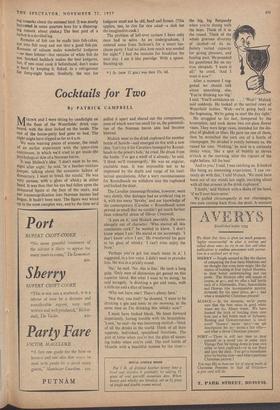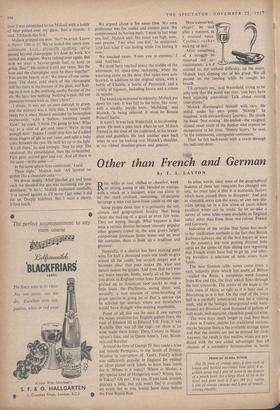Cocktails for Two
By PATRICK CAMPBELL
MULOCK and I were sitting by candlelight on the floor of the Waterfields' drink cup- board, with the door locked on the inside. The rest of the house-party had gone to bed. The night might have slipped as far as 4 a.m.
We were wearing pieces of armour, the result of an earlier experiment with the space-time continuum, in which we'd tried to get inside the Psychological skin of a Norman baron.
It was Mulock's idea. 'I don't want to be me, n. ight after night,' he said, 'in a heather-mixture Jumper, talking about the economic failure of democracy. I want to break the mould.' He was very serious, with a glass of whisky in either hand. It was then that his eye had fallen upon the armoured figure at the foot of the stairs, and our transmogrification into Norman barons had begun. It hadn't been easy. The figure was wired oP in the most complex way, and by the time we'd
pulled it apart and shared out the components, most of which were too small for us, the potentiali- ties of the Norman baron idea had become blurred.
Mulock went to the drink cupboard for another bottle of Scotch—and emerged on fire with a new idea. 'Let's try it for Cavaliers besieged by Round- heads in the priest's hole,' he cried. He drank from the bottle. 'I've got a whiff of it already,' he said. 'I think we'll transmogrify.' He was an angular, excitable man. It was impossible not to be impressed by the depth and range of his intel- lectual speculations. After a wary reconnaissance for Roundheads we withdrew into the cupboard and locked the door.
The Cavalier transmogrification, however, went very slowly. Our dialogue had an artificial ring to it, with too many `Sirrahs,' and our knowledge of the contemporary (Cavalier v. Roundhead) scene proved so small that we couldn't get much farther than colourful abuse of Oliver Cromwell.
'A pox on it,' said Mulock peevishly. He came abruptly out of character. 'Who started all this continuum cock?' he wanted to know. 'I don't know where I am.' He stared at me accusingly. 'I don't know when I am.' He transferred his gaze to his glass of whisky. 'I can't even enjoy the Now.'
`Perhaps you've got too much water in it,' I suggested, in a low voice. I didn't want to provoke him. He was in a prickly mood.
'No,' he said. `No, this is fine.' He took a long gulp. 'Only men of distinction get gassed on this superior blend. But what I want to be doing,' he said savagely, 'is drinking a gin and tonic, with a little ice and a slice of lemon.'
`Why not have one'? There's plenty here.'
`Not that, you fool!' he shouted. 'I want to be drinking a gin and tonic in the morning, at the same time as I'm drinking this whisky now!'
I must have looked blank. He leant forward impatiently, having trouble with his breastplate. 'Look,' he said—he was becoming excit:xi—`think of all the drinks in the world. Think of all their separate, individual, specialised functions. The pint of bitter when you're hot, the glass of steam- ing toddy when you're cold. The cool bottle of Moselle with a beautiful woman by the river— the big, big Burgundy when you're dining with the boys. Think of it in the round. Think of the whole glorious diversity of alcohol—of its in- finitely varied capacity for giving pleasure, and healing pain.' He pounded his gauntleted fist on my iron shinpads. '1 want it all!' he cried, 'And I want it now!'
After a moment I sug- gested we should talk about something else. `You're thinking too big,' I said. 'You'll unbalance us. . . ."Wait !' Mulock said suddenly. He looked at the serried rows of Waterfield bottles. 'Wait—we're going back to the beginning. We're going to start the day right.'
He struggled to his feet, hampered by the breastplate, and took down two cut-glass flower vases. They were large vases, intended for the dis- play of gladioli or lilies. He gave me one of them, then he wrenched the cork out of a bottle of champagne. He divided it evenly between us. He raised his vase. 'Nothing,' he said in a curiously shaky voice, 'like a spot of bubbly at eleven o'clock in the morning, after the rigours of the night before. All the best.'
`And to you; I said. I was catching on. It looked like being an interesting experiment. '1 can cer- tainly do with this,' I told Mulock. 'We must have been out of our minds last night, mucking about with all that armour in the drink cupboard.'
'I doubt,' said Mulock with a shake of the head, `if we'll ever learn sense.'
We pulled circumspectly at our champagne, two men coming back from the dead. A moment later I was astonished to see Mulock with a bottle of beer poised over my glass. 'Just a minute,' I said. 'I'll finish this first.'
MuloCk gripped my arm. 'No !' he cried. 'Leave it there ! This is it! We've nailed the space-time continuum. Loi:;,, spzaking, we've passed beyond champagne. It's done its work. It's, started our engines. We're ticking over again. But now we want a heavier-grade fuel, to keep us going. Beer!' He sloshed it into our vases. 'But the beer and the champagne must be there together! You.see the beauty of it? We retain all our sensa- tions. The sharp, cold shock of the champagne still lies there in the bottom of the glass, and-float- ing on it now is the soothing, earthy flavour of the ale. We have lost nothing. Nothing is pail All our pleasures remain with us. Here's how !'
I drank. It was not an .easy concept to grasp, and the mixture was a little thin. I wasn't really ready for it when Mulock pounded his breastplate exuberantly, with a hollow, booming sound. 'God!' he cried, 'I think I'm going to live! What say to a shot of gin and tonic? We're strong enough now.' Before I could stop him he'd added three fingers of gin to our vases, and split a baby tonic between the two. He held his up to the light. 'It's all there,' he said lovingly. 'Step by step. The awakener, the consolidator, then the re-launcher. First gear, second gear and top. And all there in the same—in the same ' `In the same splace-time continuum,' I said. `Thass right,' Mulock said. 'All layered to- gether like a chacalate coke—' We drank deeply. After another gin and tonic each we decided the gin was becoming too pre- dominant. 'It isn't,' Mulock explained carefully, 'I've turned against it. I'll never f'get what it did for us. Deeply indebted. But I want a sherry, b'fore lunch.'
We argued about it for some time. My own preference was for vodka and tomato juice. We compromised by having both. '1 want to feel what you feel,' Mulock said. His voice was high, now, and precise. 'Feel what you feel,' he explained, 'and *fccl what I was feeling while I'm feeling it now.'
We touched vases. 'From you to eternity,' I said. 'And back.'
We must have reached about the middle of the afternoon, by space-time reckoning, when the knocking came on the door. Our vases were now layered, in addition 'to the original strata, with a bottle of Chablis, a bottle of Pommard, and a variety of liqueurs, including Izarra and a creme de menthe.
The knocking increased in intensity. Mulock put down his vase. It was full to the brim, like mine. with a muddy, purple brew.. `Mafeking,' said Mulock, 'is being relieved. It must be Bonnie Prince Charlie.'
It wasn't. It was Jack Waterfield, in his dressing- gown. He took a pace back when he saw Mulock framed in the door of the cupboard, in his breast- plate and gauntlets. He took another pace back when he saw me looking over Mulock's shoulder, in my ribbed shoulder-pieces and greaves. 'How's about bed, chaps?' he said after a moment, in Il a strained voice. 'Cynthia's rat her kicking up hell.'
After something of a struggle he removed our ac- coutrements a n d assisted' us, not without difficulty, up the stairs. Mulock kept slipping out of his grasp. We all paused on the 'landing while he caught his breath.
`I'll certainly say,' said Waterfield, trying to be jolly now that 'the worst-was over, 'you boys have been enjoying yourselves. Talk about mixing your drinks!'
Mulock disentangled himself with care. He stood, under his own power. 'Mixing?' he inquired, with extraordinary courtesy. He shook his head. 'Not mixing.' He smiled—the resigned, almost sweet smile of the thinker who expects no recognition in his time. 'Merely layers,' he said, 'in the continuous, contiguous continuum.'
Then he fell backwards with a crash through his bedroom door.











































































 Previous page
Previous page